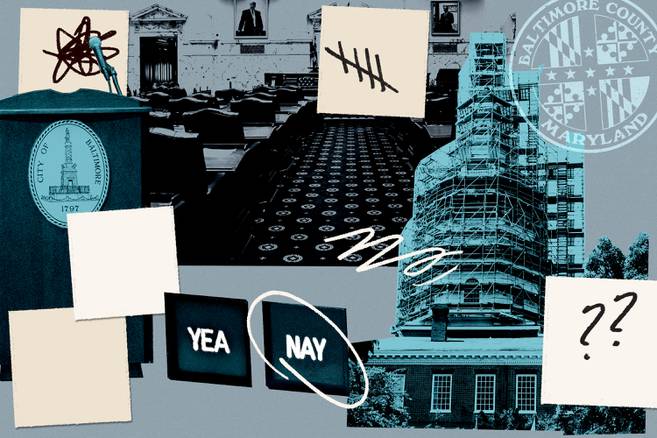
Shannon Sneed gave an early peek into 2024 campaign finances this month when the Democrat filed new records of donations to qualify for public financing.
Candidates last reported their fundraising in January and won’t have to report any financial activity until next year. We’ve had no official idea of how much — or how little — most candidates raised in 2023.
That is except for City Hall hopefuls like Sneed who are gunning for office through the city’s Fair Election Fund. The program matches donations of less than $150 to candidates who agree to eschew donations from corporations, unions and PACS.
Sneed’s campaign reported just over $21,650 in contributions in a filing earlier this month, which qualifies the candidate for City Council president for the program. She faces incumbent Nick Mosby and Councilman Zeke Cohen in the Democratic primary.
Some of Baltimore’s big-ticket donors gave to Sneed.
David Bramble, who is developing Harborplace, donated $150. He donated $2,500 to Cohen in 2020 for his council seat campaign, and another $2,000 to Cohen in 2021. Bramble donated $5,000 to Mosby in 2021.
Alex Smith of Atlas Restaurant Group donated $26.01. He donated $3,000 to Cohen’s 2016 campaign.
Behind-the-scenes politicos gave, too.
Tucker Cavanagh, who advised Tom Perez and Sneed on their gubernatorial campaign in 2022 and served as Baltimore County Executive Johnny Olszewski’s campaign manager in 2018, gave $15.69.
Sneed’s fundraiser, Colleen Martin-Lauer, who also works for Mayor Brandon Scott, gave $150.
Former City Councilwoman Helen Holton gave $25; so did City Hall’s former top lobbyist Natasha Mehu and Olszewski spokesman Sean Naron. William O’Malley, the son of former mayor and Gov. Martin O’Malley, donated $150, as did former City Comptroller Joan Pratt, former Councilman Carl Stokes and developer Ernst Valery.
To qualify for the fund, candidates for council president and comptroller must earn at least 250 small contributions totaling $15,000.
Mayoral candidates must collect at least 500 qualifying donations totaling $40,000. City Council candidates must collect at least 150 qualifying donations totaling $5,000.
Sneed is the only city candidate whose campaign has been certified for public financing. Three other candidates have submitted paperwork to the state Board of Elections and are pending approval: Wendy Bozel, who is running for mayor; Zac Blancard, who is running for the 11th District council seat; and Steven Johnson, who is running for the 6th District council seat.
Anne Arundel affordable housing bill advances with amendments
County government leaders in Anne Arundel County made several tweaks Monday to a bill designed to add more affordable housing to accommodate the area’s workforce.
The County Council’s four Democrats took turns proposing amendments, an encouraging sign for supporters of the measure that the bill can pass with a simple majority. The amendments include:
- Limiting the inclusionary housing requirements to projects with applications and permits filed after July 1, 2024;
- Striking a requirement for at least one household member be a resident of the county or be employed in the county for at least 12 months before filing an application for a moderately priced unit;
- Mandating reporting requirements to the county executive and County Council every three years about the program’s effectiveness;
- Requiring that reduced-priced units be “architecturally compatible and similar in general exterior appearance” to market-rate units.
Anne Arundel lawmakers will take the matter up again at the Dec. 4 council meeting. If passed, it would require for-sale and multi-family rental projects that exceed a certain size to reserve 15% of the units for people earning below the area-median income. In exchange, the county would waive one-time impact fees and reduce water and sewer connection bills by 50%.
Senate vacancy closer to being filled
State Del. Nick Charles of Prince George’s County is in line to move across the hall of the State House to fill a vacancy in the state Senate.
Charles was the only applicant to replace Sen. Melony Griffith, who resigned to become the head of the Maryland Hospital Association. Charles was elected to the House of Delegates in 2018 and is chair of the Prince George’s County delegation in the House.
The Prince George’s County Democratic Central Committee voted unanimously this week to forward Charles’ name to Gov. Wes Moore, who has the final say on filling vacancies in the General Assembly.
Even though Charles was the only applicant, the central committee still questioned him during a video meeting before taking their vote.
Charles addressed central committee members, touting the teamwork among officials in Prince George’s County and thanking them for their support.
“I’m looking forward to this new exciting chapter in my life,” Charles said.
Baltimore County wants people to report vacant homes
County Executive Johnny Olszewski Jr. set up a new online portal for people to report blighted buildings and view Baltimore County properties confirmed to be vacant.
In a Tuesday news release, the county executive’s press office said the new portal is a tool for the administration to find and “transform” blighted or abandoned properties “into tomorrow’s housing opportunities.” The administration says more than 160 properties have been verified as vacant, and 10 have since been either demolished or occupied.
The portal is part of a legislative package Olszewski unveiled in January to shore up housing stock and create new affordable housing. The County Council voted earlier this year to authorize the administration to build an inventory of vacant structures and create a process to classify them as such.
They also approved Olszewski’s proposal to use $16 million in federal coronavirus relief dollars to seed an affordable housing trust fund that could be used to create more affordable rental apartments and homes by acquiring vacant and tax-delinquent properties.
Properties listed in the portal include addresses, property owners, and tax IDs. The news release describes it as another of the “administration’s ongoing efforts to increase government transparency.”
New members of state LGBTQIA+ commission
Maryland Gov. Wes Moore named several new members to the Maryland Commission on LGBTQIA+ Affairs:
- Josie Caballero from the National Center for Transgender Equity
- August Clayton, founder of Mosaic, which serves Black trans men and masculine Marylanders
- Nicole Hollywood, professor at the University of Maryland, Eastern Shore and president of Salisbury PFLAG
- Tina Grace Jones, chief financial officer of For All Seasons, a nonprofit mental health and rape crisis organization
- Asher Kennedy, vice president of Hagerstown Hopes, a nonprofit that brings together straight and LGBTQ+ communities
- Paula Neira, program director for LGBTQ+ equity at the Johns Hopkins University and an assistant professor of plastic and reconstructive surgery at the Hopkins medical school
- Wendy Novak, research administrator at the University of Maryland Department of Medicine and advocate for LGBTQIA+ equity in public schools
- M Valle Pease, a graduate researcher at the University of Maryland’s Social Identity Lab
- Sarah Stern, health educator at the Johns Hopkins Center for Indigenous Health
- Kijana West, director and founder of Safe Space Cumberland, a queer community space
The new members join current members who are continuing their service on the commission: Nicholas Augustine, Lee Blinder, Joan Bryan, Amit Dhir, Kurt Doan, Deborah Dunn, Anthony Fox, Jabari Lyles, Stephen Martin, Mark Ridderhoff and Joseph Toolan.
The commission has 21 members, and the Moore administration touted the group’s diversity. The racial and ethnic composition includes eight members who identify as Black or African-American; seven who are white, three who are Hispanic or Latino and two who are Asian.
Commission members include nine who identify as transgender, nonbinary or two-spirit; four who identify as having disabilities; and two with military experience. Thirteen of the state’s 24 jurisdictions are represented.


